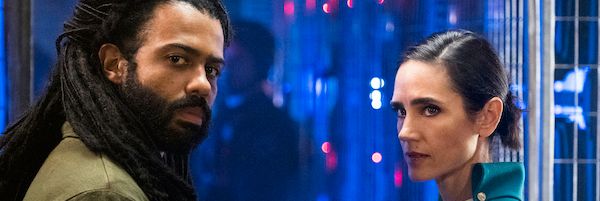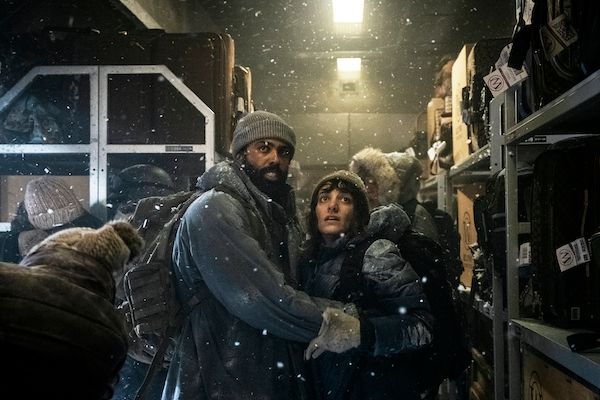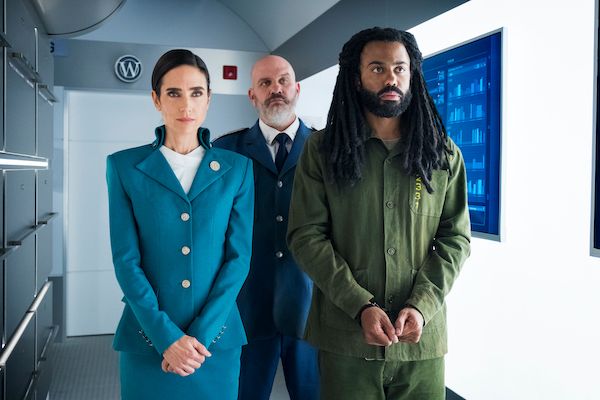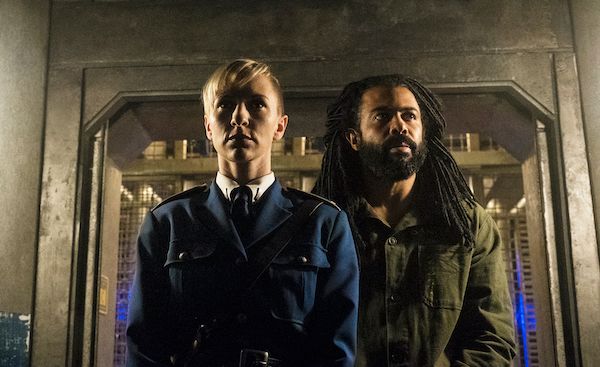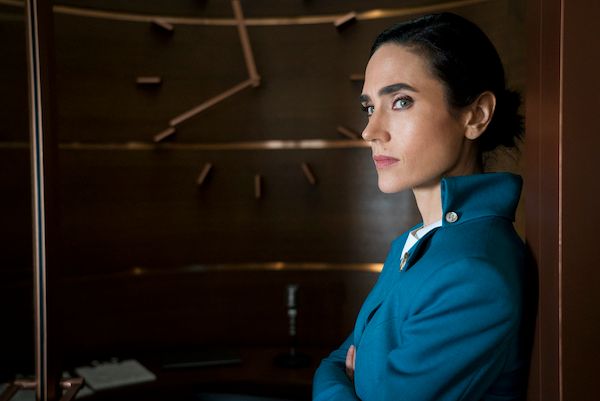It's hard to believe Snowpiercer the 2013 movie and Snowpiercer the 2020 TNT series are adapted from the same source material, the graphic novel Le Transperceneige (re-released in English in 2014, with new installments continuing the story into 2019). The former Snowpiercer is a distinctly dark, brutal, realist adaptation directed by Oscar-winning director Bong Joon Ho and starring Chris Evans, Tilda Swinton, and Ed Harris. The latter is a new TV show from Graeme Manson (Orphan Black) and sees Jennifer Connelly and Daveed Diggs leading an international cast in a more technicolor, melodramatic spin which demands patience as it finds its footing despite commendable efforts from all hands on deck.
Snowpiercer the TV series takes place several years after the cataclysmic event known as "The Freeze", a failed attempt to reverse the dangers of global warming by shooting missiles into the atmosphere to cool it and instead resulting in essentially a new Ice Age, and approximately eight years before the events of the 2013 movie. Diggs' Andre Layton, who happens to the world's last homicide detective, narrates an intriguing animated opening scene depicting The Freeze which then cuts to live action to show the panic as people without tickets to board the life-saving ark that is Snowpiercer fight for a place in the tail-end of the train. After seven years, those living in circumstances worse than what we'd define as abject poverty begin to plan a revolt (much like we see in the 2013 movie) led by Andre. It's these attempts at a revolution that set the stage for a show which attempts to explore class conflict and what it means to survive in an unthinkable scenario.
What is important to know right from the jump is even though the Snowpiercer TV series adapts from both Le Transperceneige and the movie, it functions as a kind of reboot. Shocking reveals in the movie, like truth behind the "nutrition bars" fed to those in the tail of the train, are basically common knowledge and non-essential to the plot. Meanwhile, things taken for granted in the movie, like the identity of Mr. Wilford, the creator and kind-of president of Snowpiercer, are given much more weight and mystery on the show. The movie and TV show share the same key narrative elements — global apocalypse, survivors ekeing out a new existence on a train 1,001 cars long which runs on a trans-continental track, class warfare (both overt and covert) abounds — but there should be no expectation of, say, seeing the character Evans played in the movie appearing as a younger tail-end resident. In this way, it's necessary but difficult to divorce the show from the movie, especially when the show struggles to find momentum in the first episodes.
As I watched all 10 episodes of Snowpiercer's first season (it has already scored a Season 2 renewal), I have to come clean and admit I struggled. While Snowpiercer is not necessarily unwatchable, but it's certainly not easy to remain engaged from episode to episode. I don't mind high-concept, I don't mind genre-driven, and I don't mind melodramatic. But Snowpiercer didn't just bounce between half-formed plotlines, varying tones, jarring writing, and the occasional memorably disconcerting performance choice — it careened. Unlike every passenger's firm awareness of their place on the train (and believe you me, this show loves to remind you it's about class warfare multiple times an episode), finding your bearings as a viewer is difficult.
If you know the rollercoaster production history of the Snowpiercer TV adaptation, then it might help you understand the final product. It's clear just how many hands have been on this project over the past five years, guiding the project a bit further down the road until it's parked on the side of the road, waiting for someone else to board and steer it, perhaps going down another creative path. Snowpiercer Season 1's biggest problem is it lacks focus. A plan for the most impoverished and poorly-treated passengers to take over the train is a strong enough main arc, but it also competes for your attention with a murder investigation, a shady drug scam, possible secret experiments, and shadowy, wealthy elites trying to control the entire train. Any one of these conflicts would have served has a solid, singular A-story while the rest of the series was fleshed out by the more human dramas supporting it. Unfortunately, for a show which needs to establish itself as an entity existing in the same narrative universe as a very popular sci-fi movie and an equally popular series of graphic novels, this show fails to find the narrative focus it needs to claim its rightful territory in the larger Snowpiercer canon. Without this focus of story for a majority of the season, but rather brief arcs doled out in chapters before culminating in the final two episodes of the season really helping the show gain momentum, Snowpiercer feels like it can run off the rails at any minute.
Technically, there is plenty to focus on as you watch thanks to the superb set design on various cars. You're able to easily orient yourself in the world as you move through the train. This, in combination with is overall glossy, high-resolution presentation, makes it easy to see how this TV series has a keener desire to present as a more overtly populist series, unlike its darker, comparatively more niche movie predecessor.
There are a trio of bright spots in this first season: The performances turned in by Connelly, Diggs, and Mickey Sumner (Frances Ha). As Melanie Cavill, Snowpiercer's Head of Hospitality, Connelly is absolutely living in her character's headspace and turning in an extremely watchable performance. She commands the screen, making choices in how she plays Melanie which credit her skills as a performer. Diggs is reliably sharp and skilled as Andre Layton. Aside from one or two moments of confusing histronics, Diggs' performance is visceral, pathos-driven, and compelling. Sumner plays Brakeman Bess Till, a member of Snowpiercer's police force and ally to Andre. Sumner has popped up since her Frances Ha days but Snowpiercer offers her the chance to shine — and she seizes it.
Another thing Snowpiercer manages to do well is remind you of the stakes of this post-apocalyptic situation. In one episode, a window breaks, flushing the room with -120 degree air, plus wind chill. In a matter of seconds, precious commodities vanish. The scarcity of goods and the preciousness of certain human experiences leaves you wondering how you'd feel or react if you were in that same situation. There is room for contemplation on Snowpiercer which helps keep you invested and which is necessary to help remind you just how fragile this ecosystem is. But for every thoughtful moment Snowpiercer offers, there are a dozen more confounding ones waiting to follow it up.
Ultimately, Snowpiercer will satisfy those who have been the most curious to see where it goes. With a second season on the horizon and the show making some bold moves, it's not entirely impossible for the problems plaguing this first season — most notably the narrative inconsistencies — to be smoothed out in future episodes. But a lot of patience is required in order to get to a place of appreciation for this show as part of the Snowpiercer universe, as its own endeavor, and as a TV show, generally speaking. To this end, my faith in Snowpiercer succeeding with audiences — in a world where numerous other TV shows are vying for their attention — wavers slightly. Hopefully, the only way is onward and upward in Season 2.
Rating: C
Snowpiercer premieres on TNT on Sunday, May 17 at 9/8c.

